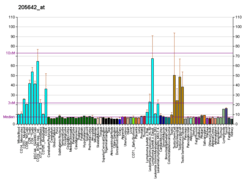CNTRL
Centriolin is a protein that in humans is encoded by the CNTRL gene. It was previously known as CEP110.[5][6]
This gene encodes a centrosomal protein required for the centrosome to function as a microtubule organizing center. The gene product is also associated with centrosome maturation. One version of stem cell myeloproliferative disorder is the result of a reciprocal translocation between chromosomes 8 and 9, with the breakpoint associated with fibroblast growth factor receptor 1 and centriolin.[6]
References
- GRCh38: Ensembl release 89: ENSG00000119397 - Ensembl, May 2017
- GRCm38: Ensembl release 89: ENSMUSG00000057110 - Ensembl, May 2017
- "Human PubMed Reference:". National Center for Biotechnology Information, U.S. National Library of Medicine.
- "Mouse PubMed Reference:". National Center for Biotechnology Information, U.S. National Library of Medicine.
- Guasch G, Mack GJ, Popovici C, Dastugue N, Birnbaum D, Rattner JB, Pebusque MJ (Mar 2000). "FGFR1 is fused to the centrosome-associated protein CEP110 in the 8p12 stem cell myeloproliferative disorder with t(8;9)(p12;q33)". Blood. 95 (5): 1788–96. PMID 10688839.
- "Entrez Gene: CEP110 centrosomal protein 110kDa".
External links
- Human CNTRL genome location and CNTRL gene details page in the UCSC Genome Browser.
Further reading
- Gromley A, Yeaman C, Rosa J, et al. (2005). "Centriolin anchoring of exocyst and SNARE complexes at the midbody is required for secretory-vesicle-mediated abscission". Cell. 123 (1): 75–87. doi:10.1016/j.cell.2005.07.027. PMID 16213214.
- Guinn BA, Bland EA, Lodi U, et al. (2005). "Humoral detection of leukaemia-associated antigens in presentation acute myeloid leukaemia". Biochem. Biophys. Res. Commun. 335 (4): 1293–304. doi:10.1016/j.bbrc.2005.08.024. PMID 16112646.
- Jurczyk A, Gromley A, Redick S, et al. (2004). "Pericentrin forms a complex with intraflagellar transport proteins and polycystin-2 and is required for primary cilia assembly". J. Cell Biol. 166 (5): 637–43. doi:10.1083/jcb.200405023. PMC 2172416. PMID 15337773.
- Ota T, Suzuki Y, Nishikawa T, et al. (2004). "Complete sequencing and characterization of 21,243 full-length human cDNAs". Nat. Genet. 36 (1): 40–5. doi:10.1038/ng1285. PMID 14702039.
- Gromley A, Jurczyk A, Sillibourne J, et al. (2003). "A novel human protein of the maternal centriole is required for the final stages of cytokinesis and entry into S phase". J. Cell Biol. 161 (3): 535–45. doi:10.1083/jcb.200301105. PMC 2172935. PMID 12732615.
- Strausberg RL, Feingold EA, Grouse LH, et al. (2003). "Generation and initial analysis of more than 15,000 full-length human and mouse cDNA sequences". Proc. Natl. Acad. Sci. U.S.A. 99 (26): 16899–903. doi:10.1073/pnas.242603899. PMC 139241. PMID 12477932.
- Ou YY, Mack GJ, Zhang M, Rattner JB (2002). "CEP110 and ninein are located in a specific domain of the centrosome associated with centrosome maturation". J. Cell Sci. 115 (Pt 9): 1825–35. PMID 11956314.
- Popovici C, Mattéi MG, Rattner JB, et al. (2000). "Assignment of the centrosomal protein 110 gene (Cep110) to mouse chromosome bands 2B-C1 by in situ hybridization". Cytogenet. Cell Genet. 89 (3–4): 216–7. doi:10.1159/000015616. PMID 10965126.
- Osaki E, Nishina Y, Inazawa J, et al. (1999). "Identification of a novel Sry-related gene and its germ cell-specific expression". Nucleic Acids Res. 27 (12): 2503–10. doi:10.1093/nar/27.12.2503. PMC 148454. PMID 10359848.
- Schütze S, Machleidt T, Adam D, et al. (1999). "Inhibition of receptor internalization by monodansylcadaverine selectively blocks p55 tumor necrosis factor receptor death domain signaling". J. Biol. Chem. 274 (15): 10203–12. doi:10.1074/jbc.274.15.10203. PMID 10187805.
- Bonaldo MF, Lennon G, Soares MB (1997). "Normalization and subtraction: two approaches to facilitate gene discovery". Genome Res. 6 (9): 791–806. doi:10.1101/gr.6.9.791. PMID 8889548.
This article is issued from Wikipedia. The text is licensed under Creative Commons - Attribution - Sharealike. Additional terms may apply for the media files.




